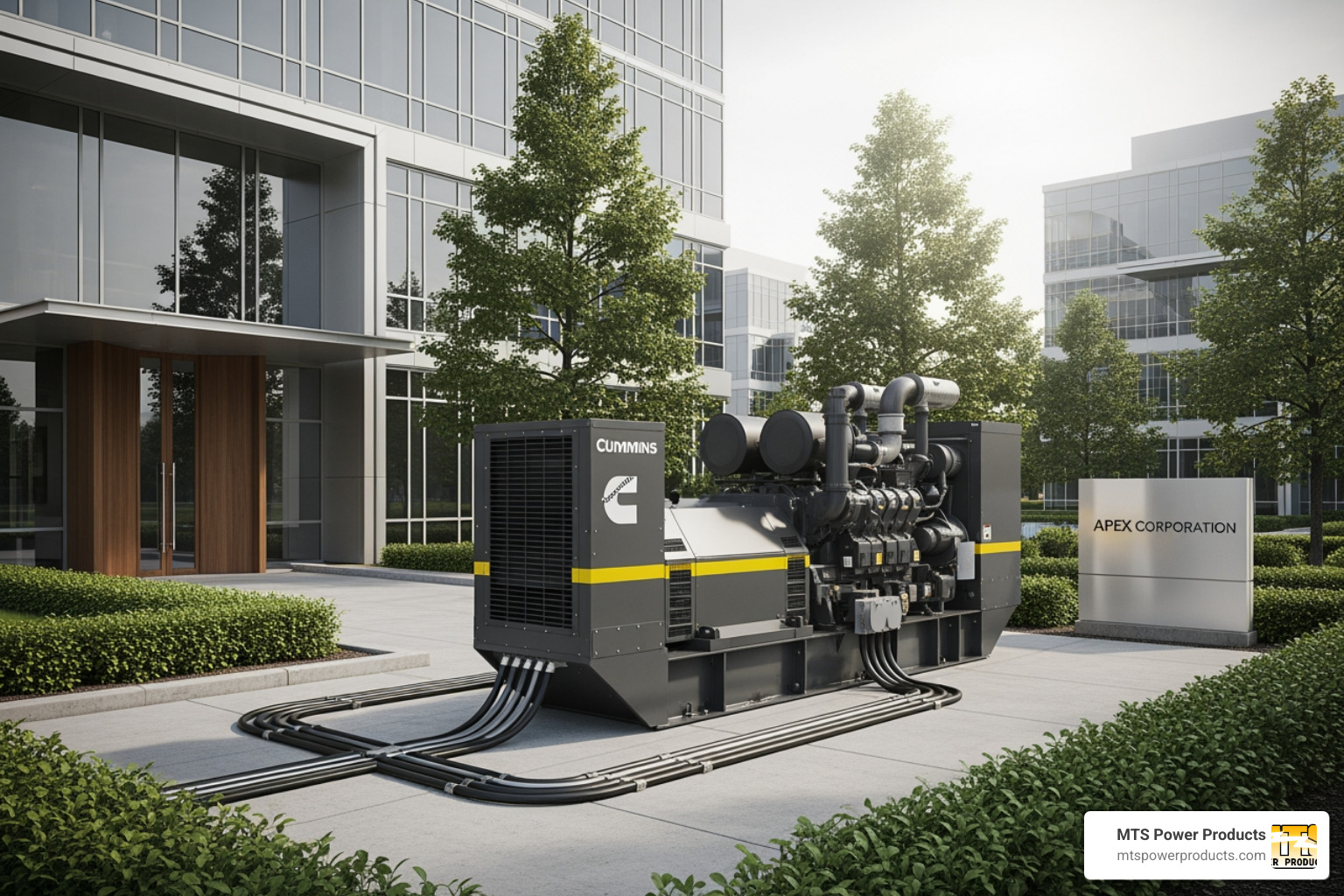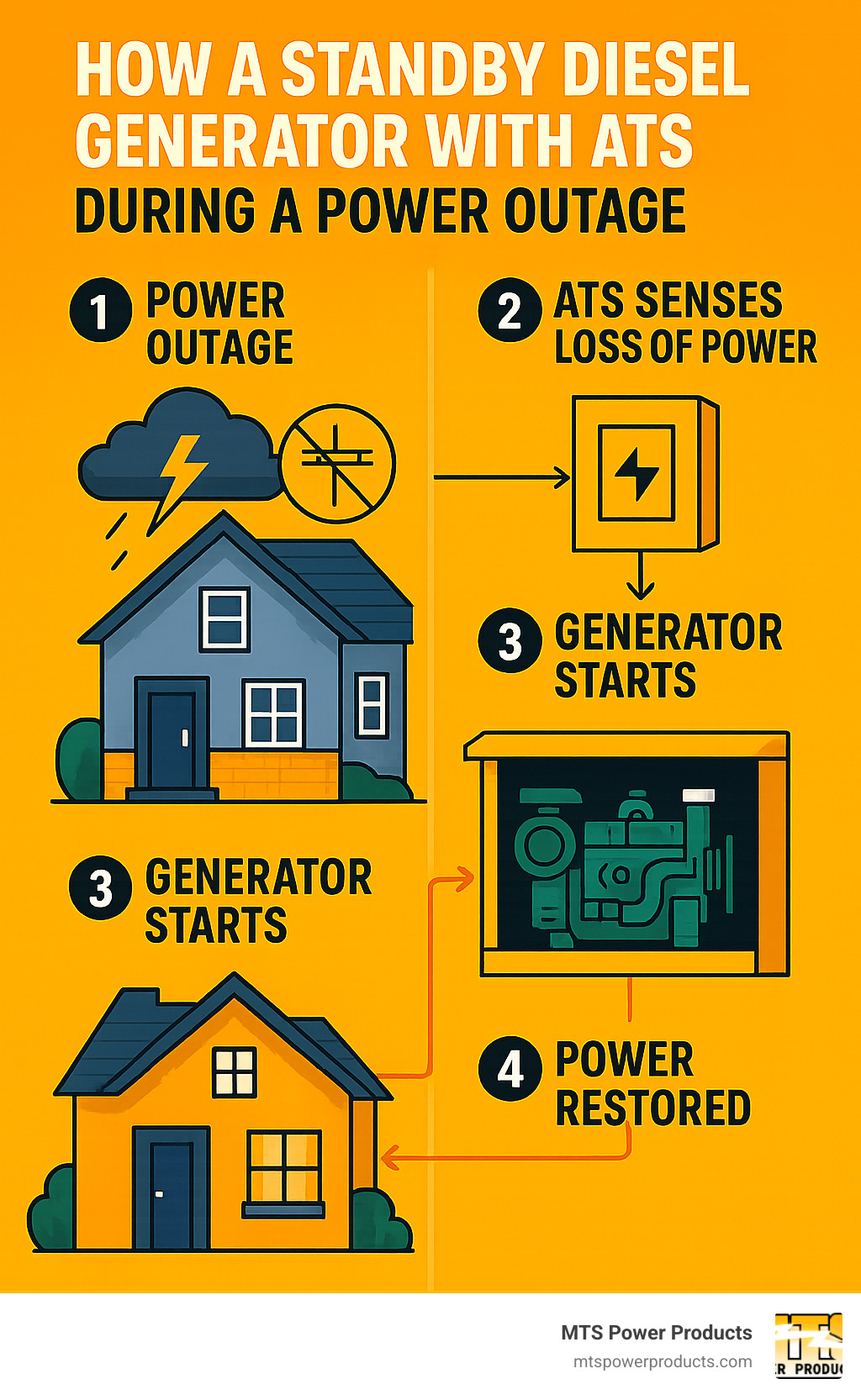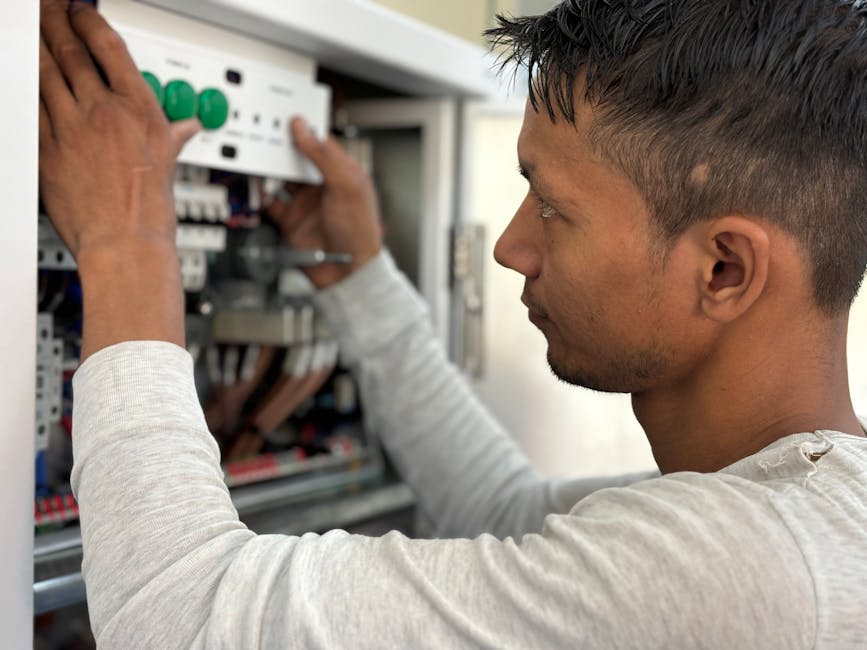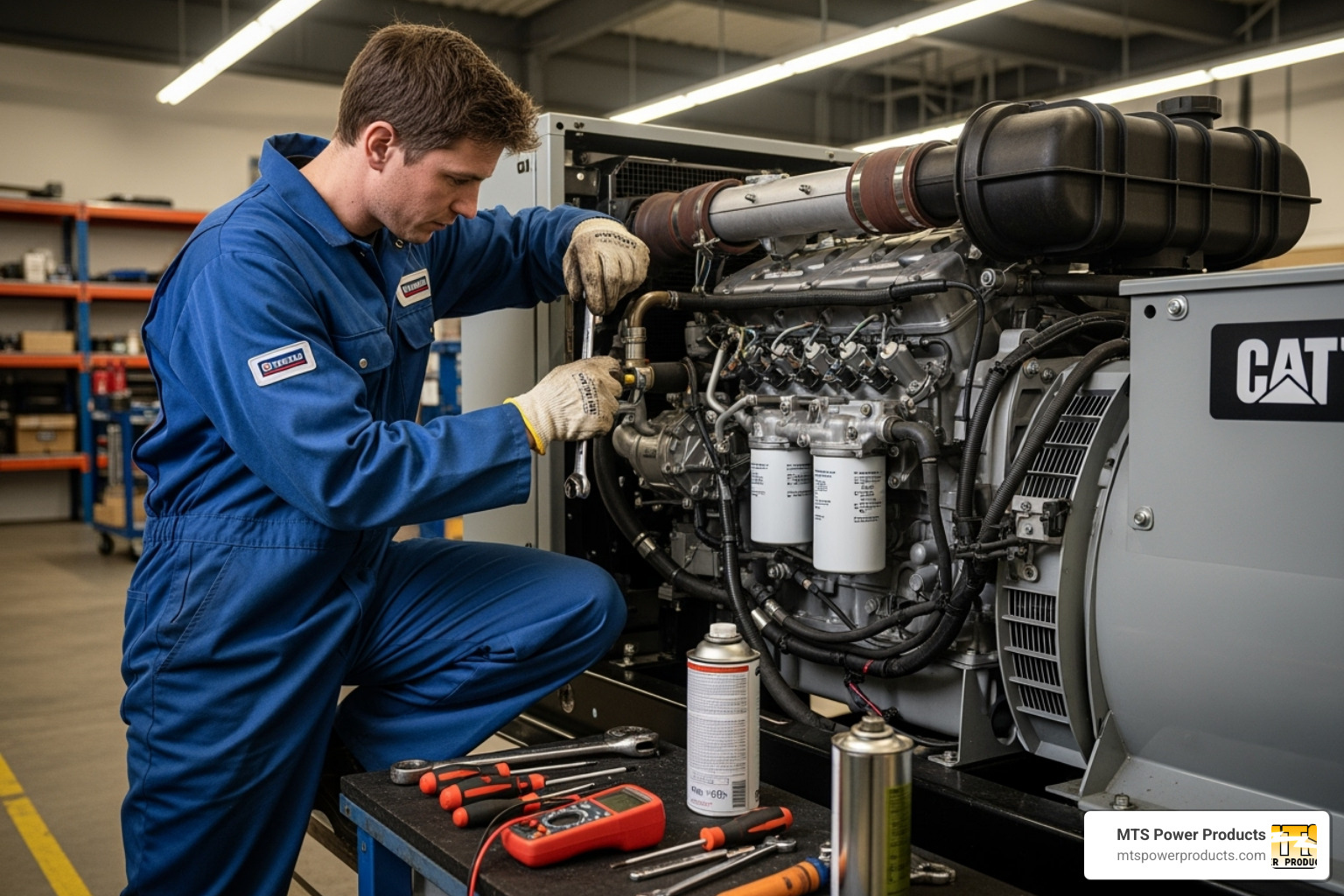
Buy Direct
from the Manufacturer
Sell our Products
Become a Distributor
Discounts
on volume purchases
Visit Us
at our Miami office
from the Manufacturer
Become a Distributor
on volume purchases
at our Miami office
A residential diesel generator offers homeowners one of the most reliable and cost-effective backup power solutions available. When storms knock out electricity or grid failures leave your neighborhood dark, these robust systems can automatically restore power to keep your family safe and comfortable.
Quick Overview: Residential Diesel Generator Benefits
During extended outages, homeowners with a whole-home standby generator can avoid spoiled food, flooded basements from failed sump pumps, and expensive hotel stays. For residents in areas prone to hurricanes or anyone who needs guaranteed uptime, diesel generators represent the gold standard in residential backup power. These systems combine automatic operation through automatic transfer switches with the proven durability that diesel engines are known for.
Modern residential diesel generators range from compact 15kW units perfect for essential circuits to powerful 50kW systems that can handle entire large homes. With proper installation and maintenance, they provide decades of reliable service while consuming significantly less fuel than alternatives.

Key residential diesel generator vocabulary:
When the lights go out, you’ll be glad you chose diesel. Residential diesel generators have earned their reputation as the workhorses of backup power through decades of reliable service in demanding conditions.
If diesel engines are trusted to power semi-trucks and keep hospitals running, they’re certainly up to the task of keeping your home comfortable during a storm. The same engineering principles that make diesel the go-to choice for critical applications make it the smart choice for your family’s backup power.
What sets diesel apart is its exceptional durability, best fuel efficiency, and rock-solid reliability. For homeowners who want a generator that works when they need it most, diesel consistently delivers. Learn more about the compelling reasons to own a residential generator (diesel).
| Feature | Diesel Generators | Gasoline Generators |
|---|---|---|
| Fuel Efficiency | 25-30% better | Standard baseline |
| Lifespan | 15,000-30,000 hours | 6,000-10,000 hours |
| Maintenance Intervals | 250-500 hours | 100-200 hours |
| Fuel Safety | Low flammability | High flammability |
Your wallet will thank you for choosing diesel. Residential diesel generators consume 25-30% less fuel than comparable gas generators for the same power output. This translates to longer runtimes and significant savings during extended outages.
The savings don’t stop there. Diesel fuel has a much longer shelf life than gasoline, so you won’t need to drain and refill your tank frequently. The fuel stays fresh and ready. During a multi-day outage, a diesel system can deliver stable, consistent power for a whole house while consuming far less fuel than a gas alternative, making it a financially sound choice for diesel generator for whole house applications.
Diesel generators are built to last decades, not just years. While a gas generator might offer 6,000-10,000 hours of service, a quality residential diesel generator will run for 15,000-30,000 operating hours. That’s 15-20 years of reliable backup power with proper maintenance. Leading manufacturers like Generac and Kohler also offer diesel options that demonstrate this exceptional longevity.
The secret is the diesel engine’s simpler, more robust design. With fewer moving parts and heavy-duty, liquid-cooled engines, they handle stress better than air-cooled alternatives. When you invest in diesel, you’re buying peace of mind for the next two decades. Our experience in diesel engine generator manufacturing confirms these engines maintain performance year after year.
Safety is paramount when storing fuel near your home. Diesel fuel is significantly less flammable than gasoline, reducing risks and providing better peace of mind.
Weather doesn’t stop diesel generators. From a frigid January morning to a sweltering August afternoon, these units start reliably and maintain consistent power. Excellent cold-start capability ensures your generator fires up in low temperatures, while robust cooling systems prevent overheating in extreme heat. This consistent performance is crucial for protecting sensitive electronics, which need the clean, stable power that our household diesel generators are designed to provide.
When considering a residential diesel generator, it’s important to look beyond the initial price tag. The real story is in the total cost of ownership, where diesel generators often prove their long-term value. Think of it as an investment in peace of mind; during a long power outage, having lights, refrigeration, and climate control is invaluable.

The upfront cost of a residential diesel generator varies based on its capabilities. A generator for essential circuits is very different from one designed to power an entire home.
Price differences depend on power capacity (kW), fuel efficiency, automation features, and overall build quality. For comparison, you can explore options from established brands like Cummins to understand the full market range.
Professional installation is a critical part of the investment, typically running from $500 to $4,000 depending on complexity. This includes several key components:
This is where diesel’s value becomes clear. A residential diesel generator typically costs only $200-$300 annually in maintenance. With service intervals of 250-500 operating hours—far less frequent than gas units—routine maintenance like oil changes and filter replacements is less of a burden.
The fuel efficiency advantage also adds up, keeping operating costs manageable during long outages. Working with a reputable diesel generator dealer ensures you have access to expert service and maintenance plans to protect your investment.
Choosing the right residential diesel generator is crucial. Getting the sizing wrong can mean paying for capacity you don’t need or having a unit that can’t handle the load. The key is to decide if you want to power just the essentials or your entire home.

Our guide on choosing the best diesel home generator dives deeper, but here are the key steps.
Correct sizing is critical. You must account for both running watts (continuous use) and starting watts (the initial surge for motors).
For whole-house coverage, you’ll likely need 20kW or more. A good rule of thumb is to calculate your total power needs and multiply by two for the recommended generator size, as generators can typically only take on half their rated load instantly. Companies like Briggs & Stratton also offer sizing calculators to help determine your needs.
For residential use, standby diesel generators are the premier choice for convenience and reliability. These permanently installed systems work automatically with an Automatic Transfer Switch (ATS).
When power fails, the ATS detects the outage, starts the generator, and transfers your home’s electrical load seamlessly. When utility power returns, it reverses the process. This hands-free operation is perfect for protecting critical equipment like medical devices or sump pumps, and for ensuring your daily routine continues uninterrupted. Our team specializes in robust diesel standby generators, ensuring a properly sized and professionally installed system.
Owning a residential diesel generator requires some attention and care, but these low-maintenance units reward you with decades of service. Regular maintenance is an investment in peace of mind, ensuring your generator is ready when you need it most.

A residential diesel generator needs service every 250-500 operating hours or annually. This is about half as often as comparable gas generators. Key tasks include:
While you can perform visual checks, professional servicing is recommended to catch small issues before they become major problems.
Protecting your family and property is the top priority.
At MTS Power Products, we prioritize safety and environmental responsibility. Our Miami-based team ensures your system meets all regulations and includes advanced safety features for your confidence.
Here are answers to some of the most common questions homeowners have about residential diesel generators.
Modern residential diesel generators are surprisingly quiet. Equipped with sound-attenuated enclosures, many models operate at 65 decibels (dB) or lower—about as loud as a normal conversation or a central air conditioning unit. This means you get reliable backup power without disturbing your neighbors. Always check the decibel rating when choosing a unit to ensure it meets local noise ordinances.
Yes, a properly sized residential diesel generator can power your entire home. Whole-house generators, typically rated at 20kW or higher, can handle major appliances like air conditioning, water heaters, and refrigerators simultaneously. An Automatic Transfer Switch (ATS) seamlessly transfers your home’s electrical load to the generator during an outage and back again when power is restored. This provides uninterrupted comfort and convenience. We offer a range of diesel gensets for sale that can be perfectly matched to your home’s specific power needs.
A key advantage of diesel is longevity. A well-maintained residential diesel generator can provide 15,000 to 30,000 operating hours, which translates to a 15-20 year lifespan. Diesel engines are more robust than their gasoline counterparts, with fewer moving parts. The lifespan depends on three key factors:
With proper care, your generator is a long-term investment in your home’s security and your family’s peace of mind.
A residential diesel generator delivers peace of mind with best durability, fuel efficiency, and a lifespan that can stretch for decades. These robust systems prove their worth when it matters most.
Choosing a generator is about partnering with experts. At MTS Power Products, we manufacture our generators right here in Miami, Florida. When you work with us, you’re talking directly to the source—no middlemen, just honest expertise from the people who build the systems.
Our McPherson Controls line sets us apart. We integrate programmable displays and advanced switch mechanisms for superior control. With our remote monitoring capabilities and improved safety features, you get a system built for the modern homeowner.
Our Miami location, minutes from the airport and port, allows for fast, worldwide delivery. As a South Florida-based manufacturer, we understand the challenges of hurricane season and aging infrastructure. We build custom generator solutions custom to your home’s specific needs.
Ready to secure your power? Let us help you find your ideal diesel powered generator and find why we’re the premier choice in South Florida for reliable backup power.
